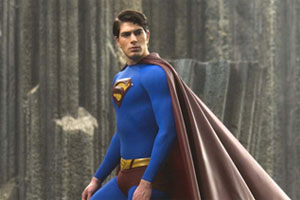
 Watch Clips From "Superman Returns"
Lois, Will You Come With Me?
Watch Clips From "Superman Returns"
Lois, Will You Come With Me?I Thought I Would Never See You Again
Where Did You Go?

But don't take the word of this Christian evangelical for it. I saw the movie with a friend who is not a Christian believer. Immediately afterward, as we said goodbye, we remarked casually about what a great movie it was—both of us having different reasons for thinking so, I was sure. Then the next night, we spoke by phone. Without my asking, he volunteered, "I can't stop thinking about 'Superman Returns.' I mean, the Gospel imagery was just so incredible."
And then he said it: "You know, 'Superman Returns' spoke more to me about Jesus than 'The Passion of the Christ.'"
I know my friend's reaction is one that will be replicated millions of times over in the coming weeks. "The Passion" was a literal presentation of Jesus Christ, which meant that nonbelievers could easily dismiss it. But "Superman Returns" speaks of Christ through symbolism, which often reaches the heart before the head.
Many people have already realized the parallels between Superman and Jesus Christ. David Bruce, the founder of HollywoodJesus.com, tells me that the offline email correspondence he has received about "Superman Returns" almost rivals that of "The Passion of the Christ."
It is an apt comparison, in many ways. Certainly, the studio behind "Superman Returns" has hopes for a "Passion"-sized box office take. But there is also a spiritual kinship in the subject matter itself. Like "The Passion," at the center of "Superman Returns" is a figure based on the Savior.
As the movie opens, we hear Jor-El, Superman's Kryptonian father, once again establish this as the story of a heavenly father who sends his only son down to Earth. "You will travel far, my little Kal-El, but we will never leave you—even in the face of our deaths. You will make my strength your own. You will see my life through your eyes, as your life will be seen through mine. The son becomes the father. And the father, the son."
Moments later, we learn that Superman--our Christ figure--left Earth five years ago and ascended to the heavens, returning to his home planet Krypton to confirm that it was destroyed. The time he is away from Earth is reminiscent of the time between Christ's ascension and return. While gone, he finds that he is, in fact, the planet's only survivor--the Only Son.
When Superman comes back to Earth, he finds a world much worse off than when he left. Most upsetting to him personally, Lois Lane--our Mary figure, with resonances of both the Magdalene and Mary the mother--has moved on. She has a fiancé and a 5-year-old son named Jason (which is a derivation of the name Jesus).
Superman, depressed over the apparent loss of the love of his life, soars into the heavens to clear his head. While hovering over the Earth in the silence of space, the voice of his father reminds him of his heavenly mission. "They can be a great people, Kal-El; they wish to be. They only lack the light to show the Way. For this reason above all, their capacity for good, I have sent them you—my only son."
When Superman and Lois finally meet face to face for the first time in five years, she reveals her anger at him for his unexplained disappearance. In his absence, she'd even won a Pulitzer Prize for an article entitled, "Why the World Doesn't Need Superman." In an almost anti-Christic line, she bluntly tells him: "The world doesn't need a savior. And neither do I." To which Superman gently replies, "You wrote that the world doesn't need a savior. But everyday I hear people crying for one."
But despite his broken heart, Superman must face a more far-reaching and potentially tragic challenge. Lex Luthor (our "Lex Lucifer") has been released from prison--like Lucifer released from the prison of the Abyss. Once free, Luthor immediately sets about his plan to create a worldly kingdom (sound biblically familiar?): Using land-forming crystals stolen from Superman's Fortress of Solitude, he plans to raises a new landmass in the middle of the ocean, obliterating billions of people in the process, paralleling the events predicted in the Bible for Armageddon. In an exchange laced with Satanic undertones, Lex's girlfriend Kitty, upon hearing his plan, reminds him, "You're not a god." Lex shoots back: "Gods are selfish beings who fly around in little red capes and don't share their power with mankind."
In one of Superman's confrontations with his arch-enemy, Luthor stabs Superman in the right side with a kryptonite dagger, which recalls the spear that pierced the right side of Christ. Our superhero then undergoes a brief reenactment of the march of the Passion. Superman tries to crawl away from his persecutors while struggling under the weight of kryptonite poisoning. His recovery is only one of two resurrections he undergoes in the movie; the second even involves the discovery of the modern-day equivalent of an empty tomb.
Superman discovers to his horror that the entire landmass Luthor created is laced with kryptonite. Here, as in other stories of Superman, kryptonite represents sin: Not only does kryptonite cause great pain to our Christ figure, but it gives power to his evil enemies.
In setting about to rescue the world from this deadly danger, Superman symbolically takes the weight of a world of sin upon himself. As in the Gospel story, this supreme act of sacrificial suffering has disastrous consequences and Superman plummets back toward the Earth--in the crucifixion pose, no less.
As a parable of Christ, "Superman Returns" is truly miraculous. And as a mainstream movie, the film has it all: solid storytelling, fast-paced action, eye-popping special effects (some used for Christic effect), and even romance. See it. Soar with it. And, just in case you go with a non-Christian, be prepared to quote book, chapter, and verse from this latest and perhaps best edition of the Kryptonian gospel--as well as from that original story it so clearly parallels.

